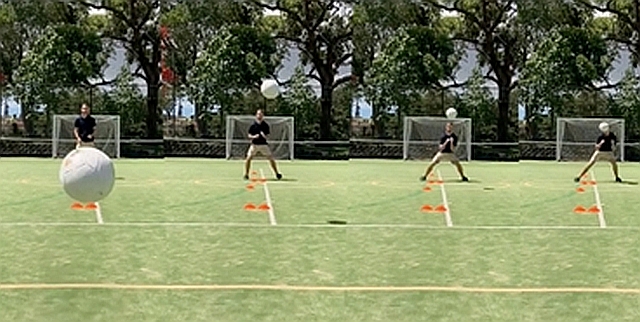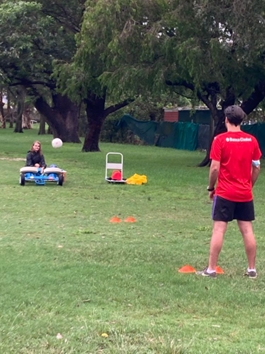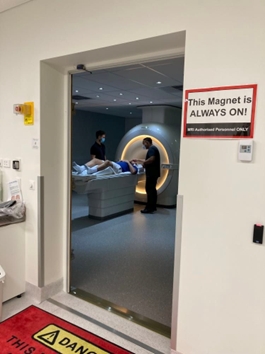
RESEARCH SPOTLIGHT Biomarkers of sUbconcussive iMpacts in sPort: The ‘BUMP’ trial
MRI at NeuRA Imaging is being used to examine the structural, functional, and chemical effects of soccer heading on the brain.

The University of Sydney’s Lambert Initiative is conducting a randomised controlled trial at Neuroscience Research Australia (NeuRA) to better understand how subconcussive head impacts affect the brain.

The trial, which is the first of its kind, is using MRI to examine the structural, functional, and chemical effects of soccer heading on the brain.
Many athletes in rugby, soccer, and other contact sports regularly experience subconcussive impacts. A subconcussive impact is defined as a head impact that does not result in a clinical concussion. Recent observational research suggests that subconcussive impacts can elicit detectable neural changes and there is also emerging evidence that multiple subconcussive impacts over a sporting career may negatively impact brain health.
The ‘BUMP’ trial is being coordinated by Nathan Delang, a Griffith University Ph.D. candidate who is visiting the Lambert Initiative. It is being overseen by Professor Iain McGregor, Professor Luke Henderson, and Dr Danielle McCartney, with the support of other leading researchers from the University of Sydney, Griffith University and Monash University.
 Participants (all healthy soccer players) visit NeuRA on two occasions. On one occasion, they perform 20 standardised soccer headers using a soccer machine, and on the other, a control kicking task. The athletes then undergo a host of high-quality, advanced MRI acquisitions including magnetic resonance spectroscopy, functional MRI, arterial spin labelling, diffusion weighted imaging, susceptibility weighted imaging and electrical properties tomography. They also complete an electroencephalogram (which measures electrical activity in the brain), blood tests (for biomarkers of neuronal damage) and a series of neurocognitive function tests.
Participants (all healthy soccer players) visit NeuRA on two occasions. On one occasion, they perform 20 standardised soccer headers using a soccer machine, and on the other, a control kicking task. The athletes then undergo a host of high-quality, advanced MRI acquisitions including magnetic resonance spectroscopy, functional MRI, arterial spin labelling, diffusion weighted imaging, susceptibility weighted imaging and electrical properties tomography. They also complete an electroencephalogram (which measures electrical activity in the brain), blood tests (for biomarkers of neuronal damage) and a series of neurocognitive function tests.
Interestingly, if the subconcussive soccer heading task is found to produce a reliable ‘biomarker response’, it could also be used to probe the initial utility of novel concussion therapies (which might attenuate this response). It is hoped that this research will provide the missing link to expedite human research into therapies for concussion.
To date, eight participants (53%) have completed this rigorous clinical trial and it is expected that data collection will conclude before the end of the year.
For more information on the BUMP trial, please visit: https://www.anzctr.org.au/Trial/Registration/TrialReview.aspx?id=382590&isReview=true
Recent Comments